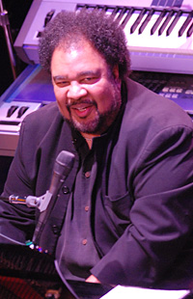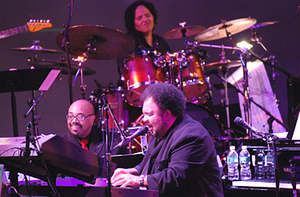George Duke: On Top of the Business

George Duke
Photo by Phil Farnsworth

George Duke performs at the Berklee Performance Center with faculty keyboardist George Russell and faculty percussionist Terri Lyne Carrington.
Photo by Phil Farnsworth
That George Duke possesses extraordinary music gifts is indisputable. He's performed with Cannonball Adderley and Stanley Clarke; recorded with artists such as Michael Jackson and Miles Davis; and produced recordings by Jeffrey Osborne and Earth, Wind & Fire, to name a few. He's released chart-topping singles and albums and earned Grammy Awards.
But if you talk to him in person, you'll be immediately struck by his humility about those sorts of accomplishments and by his insistence that non-musical factors have as much to do with his success as anything else.
He came to the college last month to perform with faculty and students in a concert dubbed Restore the Soul, but he was generous with his time, meeting with faculty members, presenting clinics to students, and performing with many. With a few minutes to spare before giving a master class for Berklee students last month, Duke talked about business, music, and the wisdom of Frank Zappa.
RH: As you reflect on your interactions with students this week, what do they seem to be most interested in learning from you?
GD: It's not any one particular thing. The main thing I'm trying to impress upon them is the world is theirs. The whole business model has changed. The whole idea of getting a recording contract and becoming a big recording star-the whole businessside of the business-has changed. So because of the way the Internet has evolved and the way things are going, the sky's the limit.
I look at the glass being half-full, not half-empty. You're going to go out there and the people that have an idea, that believe in their own artistic worth, and find out the best way to distribute their music or their art, man, they're going to be in first place and they're going to set a new paradigm.
"The main thing I've been telling these kids, besides the whole business thing: Don't be afraid to experiment, because there's too many musical followers now and not enough musical innovators."
RH: So you tell them to be focused on their music but also to be creative about how they get it out there.
GD: It's always been about that. It's just that at one point in time no one wanted any musicians to know anything about the business side, so they got taken advantage of. But I always felt that the business side was 50 percent of it, and if you didn't know that, boy, you were in trouble.
RH: How did you learn that lesson?
GD: I just felt it. You look at the history of jazz or r&b and you can see where artists throughout the ages took one knock after the other, whether it was their songs or their publishing. "Give me 10 dollars and I'll do this." Meanwhile somebody in a suit is making thousands of dollars on something a musician has been doing his entire life and has perfected.
So the history of music in this country is kind of sad in a lot of ways. I think today is so interesting in what can happen if musicians and artists take control of their careers, cut out the middleman, and get directly to the consumer with the Internet and what other means of distribution.
RH: What about the musical side of things? As a successful producer, composer, and player, what are you trying to get across to students?
GD: More of the questions I'm getting here are about the business side, interestingly enough. No one even asked me about writing a song. No one even thinks about writing a song anymore, in the classic sense.
The main thing I've been telling these kids, besides the whole business thing: Don't be afraid to experiment, because there's too many musical followers now and not enough musical innovators. If there's one Anita Baker, we don't need a hundred more. You need to find something to the left or right of Anita Baker where you can use a lot of what Anita does, but you need to find your own voice. And I tell them it takes time.
RH: What sort of advice do you give students about finding their own voice?
GD: It's an interesting thing. Some are just born with it. They just have their voice. They know what they're doing. Others, like me, had to work on it, to really find out who I was. A lot of it is you've got to find out who you are first and what you want to represent.
It takes a lot of soul-searching. It's not just the technique. The technique is not the music. The technique is a means to an end, and just because you can play a lot of notes really fast doesn't mean you're playing music. The music is spirit, and that's very difficult to talk about in words, but I'm telling you once you find it, if you can tap into that, you've got something truly amazing and strong and something that's undeniable and will last through the years.
RH: You didn't go to a place like Berklee when you were coming up. What were some of the big lessons you learned as a developing musician, and who helped you find your voice?
GD: Finding myself definitely came from Cannonball Adderley and Frank Zappa, I would say. It was both of those guys, right around the same time. I was just watching, observing, utiltizing parts of their musical personalities, and doing what I wanted to do. Frank, for example, taught me how to just let myself go, let myself out on stage and become extroverted. I used to be an introvert. I'd sit down there and I wouldn't look at the audience. I was just totally in my own world. And he would say, "What's wrong with you, man? What, are you you sick?" He said, "You're kind of funny offstage. Why don't you bring some of this out on stage? You should play synthesizer. You should sing."
Frank also taught me that to play simpler forms of music is not abhorrent. The exact phrase he told me was, "Man you don't have to be heavy to be heavy." Cannonball told me: "You should listen to Brazilian music. You need to open up and listen to other kinds of music." So they, together, just opened me up to the world of music, and it's made me the way I am today.
RH: You're a very eclectic musician. Do you believe that quality is as important today as it was for you?
GD: Maybe even more important. I took a lot of heat. It's not the normal way to go. Normally, most musicians specialize. That's what they do. I chose a different path. I thought that diversity was the key. Like the stock market. You don't put all your money in one basket. I don't think it's enough to be a piano player-unless you're so extraordinary that's there no one else who's doing what you're doing. Well, that ain't me.
So I figured my best bet was to be diverse. Yes, I play a little piano and I probably play a little different than some people. But at the time, when I was 20 years old like some of these kids, I wanted to experiment to find out who I was and what was really going to represent what I felt inside. I started playing synthesizer, I started writing, started composing. Anything that had to do with music, I wanted to learn it. I decided to become diverse. Got into producing. Now I have a label.
RH: You've spent a lot of time at Berklee in last few years. What does a developing musician get out of being in this environment?
GD: This is an extraordinary environment. I don't think there's another place like this on the planet, and I think with the level of musicianship and in terms of teachers-you have people who are actively performing who are actually teaching students-I think that's incredible. The fact they have people like me come. The fact that the curriculum is so diverse, so broad, up and down. Everything. It's just a wonderful thing. It wasn't always like that in this place. I embrace the fact that they decided to open this up. And I think it's a testimony to the fact that you have so many students here trying to get in. I think it's an incredible opportunity. I wish I had it when I was growing up, and I applaud you guys very much.
